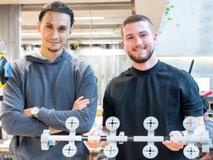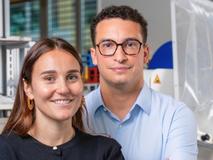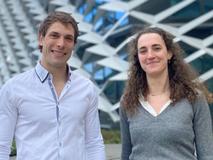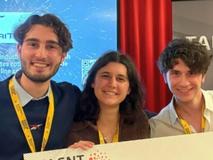Startups innovating in body weight measurement for immobile patients, biological drug production, industrial automation, cell therapy, gait rehabilitation, and reshoring each get CHF 10,000
19.02.2025
Airscale, Bioscibex, Inkocell Therapeutics, MyoLink, and Xelerit were selected at Venture Kick's first financial and entrepreneurial support stage. Their projects enable the weight measurement of immobile patients without moving them out of bed; transform biological drug development and manufacturing with their single-use bioreactor by reducing the number of process steps from 7 to just 2; bring a curative solution to cancer survivors who developed cardiac fibrosis due to their cancer treatment; reconstruct precise muscle activation patterns across the full leg—delivering actionable biofeedback with a rapid setup in under two minutes; and enable reshoring by making automation faster and cheaper.
 |
 AirScale: CEO Sohail Zubi and CTO Andreas Laursen
|
 Bioscibex: CEO Chloé Albietz & CTO François Carruzzo
|
 Inkocell Therapeutics: CEO Mathieu Girardin & CSO Angela Madurga Alonso
|
 MyoLink: CEO Vincent Mendez and Supervisors Fiorenzo Artoni and Silvestro Micera
|
 Xelerit: CEO Federico Martelli, CPO Camilla Mazzoleni, and CTO Riccardo Maggioni
|
AirScale: Mesuring body weight of immobile patients with a simple push of a button
The measurement of body weight is essential for patients in critical health situations, as it enables the identification of muscle loss, fluid loss, or water retention. Patients' weight must be measured daily to track changes in their condition, a process that takes 10 minutes and requires the assistance of 2-3 staff members. Given the immense time pressure faced by nursing staff, this task is often challenging due to time constraints and staffing limitations. Studies confirm that 30% of patients are not being weighed at all – despite prescribed medication that requires weight-based dosages. Around 20% of patients whose weight is estimated receive an inappropriate dose, leading to adverse effects and complications that prolong hospital stays and hinder patient recovery.
AirScale has developed a solution that enables the weight measurement of immobile patients without moving them out of bed. The laborious process is reduced to the push of a button, freeing precious time for the immensely busy nursing staff. The team is composed of Sohail Zubi, CEO and Andreas Laursen, CTO. Sohail is defining the value proposition, business model, and implementing the market entry strategy while Andreas is in charge of laboratory testing, rapid prototyping, and managing the supply chain. Together, they aim to develop the least time and energy-consuming weighing scale worldwide.
The startup received financial support from the Bridge Program (SNF) as well as the support of Innosuisse. AirScale has established a collaborative arrangement with the University Hospital Zurich (USZ) and the Cantonal Hospital Zug (ZGKS), serving as our implementation partners, to initiate a testing phase wherein the Minimum Viable Product (MVP) was tested with patients. The hospitals are actively engaged in the prospect of acquisition and seek to integrate their requirements during the developmental phase. They recognize the value of the solutions and are willing to invest resources during the testing phase.
Bioscibex: changing the way we make drugs forever
Biologics are remarkably effective in treating a variety of illnesses, ranging from autoimmune diseases to cancer but their high prices, mainly driven by high production cost, is limiting patient accessibility. Simplifying the production process is essential to lowering the cost of these treatments.
The company was incorporated in 2024 as a spin-off from EPFL. Drawing on their industry expertise, the two co-founders, Chloé Albietz (CEO) and Francois Carruzzo (CTO), are transforming biological drug development and manufacturing with their single-use bioreactor. By reducing the number of process steps from 7 to just 2, biopharmaceutical companies will significantly reduce their costs, contamination risks, and operational complexity. The estimated total addressable market is USD 4.5 million.
The Venture Kick funds will support the production of the beta prototype, which will be used for pilot trials with customers.
bioscibex.com
Inkocell Therapeutics: Redefining cell therapy to bring curative solutions to patients in need.
Clinicians often rely on subjective visual assessments as quantifying muscle activity during gait rehabilitation is challenging. Traditional EMG systems demand lengthy, precise electrode placement, which is impractical in busy rehab sessions and prevents timely, objective feedback.
Developed by an EPFL team led by Dr. Vincent Mendez under the guidance of Prof. Fiorenzo Artoni and Prof. Silvestro Micera, MyoLink is a wireless solution that leverages elastic bands with integrated electrode arrays and IMUs to capture high-fidelity EMG and kinematic data in real-time. Its advanced algorithms reconstruct precise muscle activation patterns across the full leg—delivering actionable biofeedback with a rapid setup in under two minutes.
The Venture Kick funds will support proof-of-concept prototyping, secure ethics approval for pilot studies, and underpin robust IP and market analyses, ensuring a clear, scalable path toward data-driven, personalized gait rehabilitation.
Xelerit: Enabling reshoring by making automation faster and cheaper
For years, European firms relentlessly outsourced production, prioritizing cost reduction over strategy. A decade later, China absorbed know-how and outcompeted on price, leaving Western companies squeezed between a cheaper China and a more innovative US. Their only alternative is reshoring to restart innovation, yet both robots and labor remain cheaper in Asia.
Xelerit enables reshoring by making automation faster and cheaper. Its hardware & application-agnostic AI co-pilot for industrial automation firms accelerates robot programming 4x, slashing software costs. With 25% of manufacturers reinvested capital flowing into automation annually, the market exceeds USD 200B. Behind Xelerit are Camilla Mazzoleni & Riccardo Maggioni (ETH Robotics) and Federico Martelli (HSG SIM).
Venture Kick funds will drive product development in tight iteration loops with clients and users.
The measurement of body weight is essential for patients in critical health situations, as it enables the identification of muscle loss, fluid loss, or water retention. Patients' weight must be measured daily to track changes in their condition, a process that takes 10 minutes and requires the assistance of 2-3 staff members. Given the immense time pressure faced by nursing staff, this task is often challenging due to time constraints and staffing limitations. Studies confirm that 30% of patients are not being weighed at all – despite prescribed medication that requires weight-based dosages. Around 20% of patients whose weight is estimated receive an inappropriate dose, leading to adverse effects and complications that prolong hospital stays and hinder patient recovery.
AirScale has developed a solution that enables the weight measurement of immobile patients without moving them out of bed. The laborious process is reduced to the push of a button, freeing precious time for the immensely busy nursing staff. The team is composed of Sohail Zubi, CEO and Andreas Laursen, CTO. Sohail is defining the value proposition, business model, and implementing the market entry strategy while Andreas is in charge of laboratory testing, rapid prototyping, and managing the supply chain. Together, they aim to develop the least time and energy-consuming weighing scale worldwide.
The startup received financial support from the Bridge Program (SNF) as well as the support of Innosuisse. AirScale has established a collaborative arrangement with the University Hospital Zurich (USZ) and the Cantonal Hospital Zug (ZGKS), serving as our implementation partners, to initiate a testing phase wherein the Minimum Viable Product (MVP) was tested with patients. The hospitals are actively engaged in the prospect of acquisition and seek to integrate their requirements during the developmental phase. They recognize the value of the solutions and are willing to invest resources during the testing phase.
Bioscibex: changing the way we make drugs forever
Biologics are remarkably effective in treating a variety of illnesses, ranging from autoimmune diseases to cancer but their high prices, mainly driven by high production cost, is limiting patient accessibility. Simplifying the production process is essential to lowering the cost of these treatments.
The company was incorporated in 2024 as a spin-off from EPFL. Drawing on their industry expertise, the two co-founders, Chloé Albietz (CEO) and Francois Carruzzo (CTO), are transforming biological drug development and manufacturing with their single-use bioreactor. By reducing the number of process steps from 7 to just 2, biopharmaceutical companies will significantly reduce their costs, contamination risks, and operational complexity. The estimated total addressable market is USD 4.5 million.
The Venture Kick funds will support the production of the beta prototype, which will be used for pilot trials with customers.
bioscibex.com
Inkocell Therapeutics: Redefining cell therapy to bring curative solutions to patients in need.
Cancer treatments lead to an increasing population of cancer survivors. 10% of them will be affected by long-term cardiovascular toxicities due to their treatment, leading to heart failure and death. This represents 4.17 million people in the US, and no curative option is available.
Inkocell Therapeutics is set to be incorporated as an EPFL spin-off by the end of 2025. Co-founders Mathieu Girardin and Angela Madurga Alonso, are advancing their technology to bring their treatment to the clinic. Their innovation leverages genetically engineered Natural Killer (NK) cells enhanced with a patented synthetic receptor. Their innovation can bring a curative solution to cancer survivors who developed cardiac fibrosis due to their cancer treatment. With a broad therapeutic potential, the technology can be adapted to reach additional markets such as other fibrotic or autoimmune diseases.
The Venture Kick funding will support the development of our intellectual property portfolio and regulatory strategy.
MyoLink: Advancing Gait Rehabilitation through Real-Time Muscle MonitoringClinicians often rely on subjective visual assessments as quantifying muscle activity during gait rehabilitation is challenging. Traditional EMG systems demand lengthy, precise electrode placement, which is impractical in busy rehab sessions and prevents timely, objective feedback.
Developed by an EPFL team led by Dr. Vincent Mendez under the guidance of Prof. Fiorenzo Artoni and Prof. Silvestro Micera, MyoLink is a wireless solution that leverages elastic bands with integrated electrode arrays and IMUs to capture high-fidelity EMG and kinematic data in real-time. Its advanced algorithms reconstruct precise muscle activation patterns across the full leg—delivering actionable biofeedback with a rapid setup in under two minutes.
The Venture Kick funds will support proof-of-concept prototyping, secure ethics approval for pilot studies, and underpin robust IP and market analyses, ensuring a clear, scalable path toward data-driven, personalized gait rehabilitation.
Xelerit: Enabling reshoring by making automation faster and cheaper
For years, European firms relentlessly outsourced production, prioritizing cost reduction over strategy. A decade later, China absorbed know-how and outcompeted on price, leaving Western companies squeezed between a cheaper China and a more innovative US. Their only alternative is reshoring to restart innovation, yet both robots and labor remain cheaper in Asia.
Xelerit enables reshoring by making automation faster and cheaper. Its hardware & application-agnostic AI co-pilot for industrial automation firms accelerates robot programming 4x, slashing software costs. With 25% of manufacturers reinvested capital flowing into automation annually, the market exceeds USD 200B. Behind Xelerit are Camilla Mazzoleni & Riccardo Maggioni (ETH Robotics) and Federico Martelli (HSG SIM).
Venture Kick funds will drive product development in tight iteration loops with clients and users.


